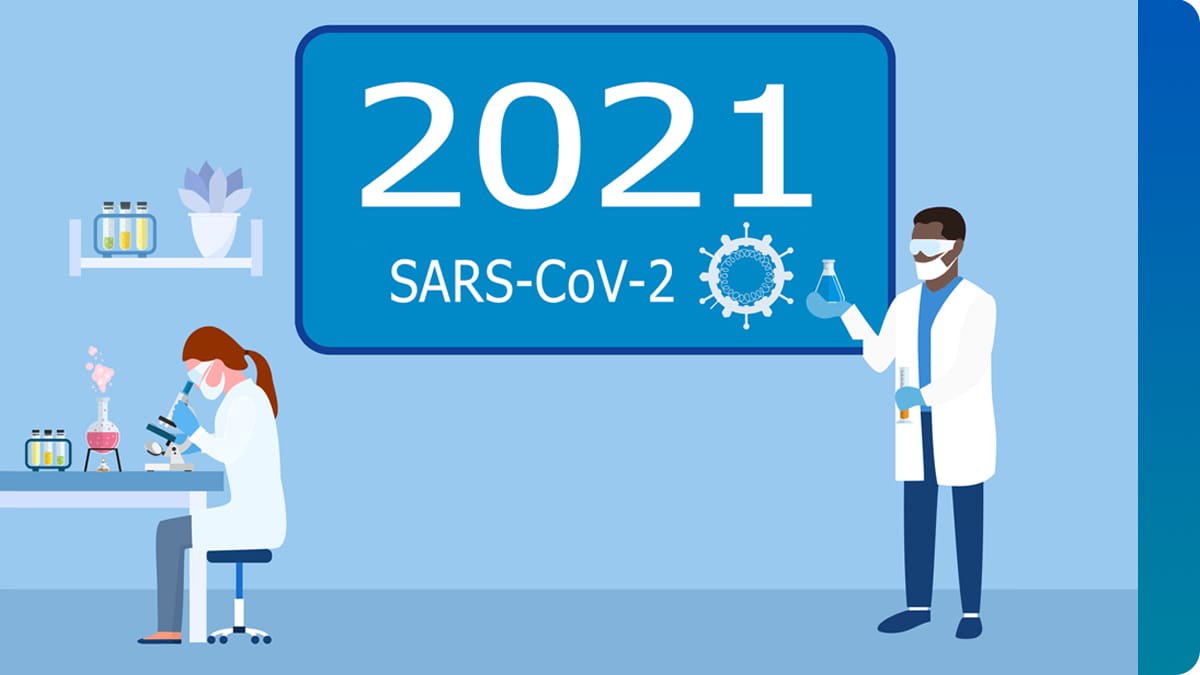What to know
Johns Hopkins University provided real-time data describing the evolution of the SARS-CoV-2 virus in communities and individuals. Awarded in 2021, this study provided data to help identify whether changes in the SARS-CoV-2 genome meant a variant could spread more easily or make people sicker. Researchers used novel methods to study how the virus evolves.

Findings on SARS-CoV-2 surveillance and investigations
This project:
- Implemented infection prevention policies to reduce the risk of SARS-CoV-2 transmission between patients and healthcare workers.1
- Generated genomes that were used for SARS-CoV-2 genomic surveillance and contact tracing and that led to identification of the first cluster of the South African variant in the State of Maryland.2
- Found that SARS-CoV-2 viruses carrying the spike protein mutation E484K were disproportionately prevalent among persons infected after full vaccination against COVID-19 compared with infected persons who were not fully vaccinated. 3
Findings on SARS-CoV-2 variant characteristics
This project found:
- Compared with the Delta variant, the Omicron variant was more likely to cause breakthrough infections in vaccinated individuals, yet hospital admissions were less likely. 6
- Certain viral variants or mutations were associated with breakthrough infection after vaccination. 7
- In both vaccinated and unvaccinated persons, the Delta variant was associated with higher viral loads than the Alpha variant. 8
- Prolonged infections, prolonged viral shedding, and viral reinfections were revealed by genomic surveillance. 9
- SARS-CoV-2 genomic diversity was reported over time in the National Capital Region as well as differences in clinical severity among lineages. 10
- The Delta variant was associated with more severe disease in hospitalized patients. 11
- Severe acute respiratory coronavirus virus 2 (SARS-CoV-2) exposure investigations using genomic sequencing among healthcare workers and patients in a large academic center. Infect Control Hosp Epidemiol, 2022.
- Linked Clusters of SARS-CoV-2 Variant B.1.351 - Maryland, January-February 2021 MMWR Morb Mortal Wkly Rep. 2021 Apr 30;70(17):627-631. doi: 10.15585/mmwr.mm7017a5
- Association of E484K Spike Protein Mutation With Severe Acute Respiratory Syndrome Coronavirus 2 (SARS-CoV-2) Infection in Vaccinated Persons: Maryland, January-May 2021. Clin Infect Dis. 2022 Jun 10;74(11):2053-2056. doi: 10.1093/cid/ciab762.
- Transmission of severe acute respiratory coronavirus virus 2 (SARS-CoV-2), delta variant, between two fully vaccinated healthcare personnel. Infect Control Hosp Epidemiol. 2022 Dec;43(12):1983-1985. doi: 10.1017/ice.2021.469. Epub 2021 Nov 8.
- Clustering of SARS-CoV-2 Infections in Households of Patients Diagnosed in the Outpatient Setting in Baltimore, Maryland. Open Forum Infect Dis. 2021 Mar 12;8(4):ofab121. doi: 10.1093/ofid/ofab121. eCollection 2021 Apr.
- The displacement of the SARS-CoV-2 variant Delta with Omicron: An investigation of hospital admissions and upper respiratory viral loads. eBioMedicine, 2022.
- Infections in mRNA Vaccinated Individuals are Biased for Viruses Encoding Spike E484K and Associated with Reduced Infectious Virus Loads that Correlate with Respiratory Antiviral IgG levels. J Clin Virol, 2022
- Infection With the Severe Acute Respiratory Syndrome Coronavirus 2 (SARS-CoV-2) Delta Variant Is Associated With Higher Recovery of Infectious Virus Compared to the Alpha Variant in Both Unvaccinated and Vaccinated Individuals. Clin Infect Dis, 2021.
- Large Scale SARS-CoV-2 Molecular Testing and Genomic Surveillance Reveal Prolonged Infections, Protracted RNA shedding, and Viral Reinfections. Front Cell Infect Microbiol, 2022.
- An Update on SARS-CoV-2 Diversity in the United States National Capital Region: Evolution of Novel and Variants of Concern. Clin Infect Dis, 2022.
- Impact of SARS-CoV-2 variants on inpatient clinical outcome. medRxiv, 2022.
